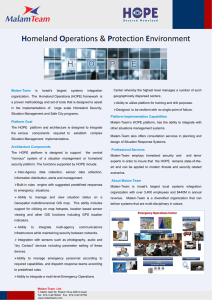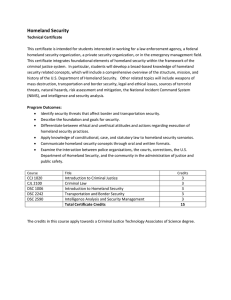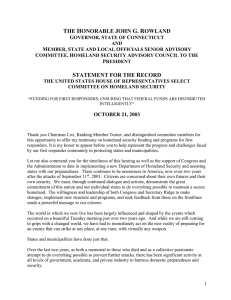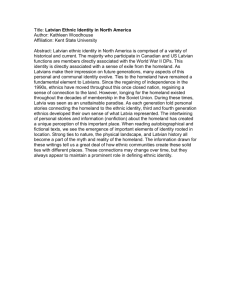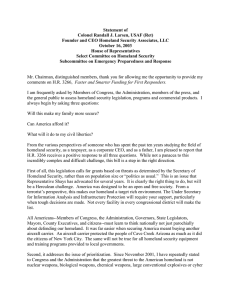Testimony of James A. Garner Mayor of Hempstead, New York
advertisement
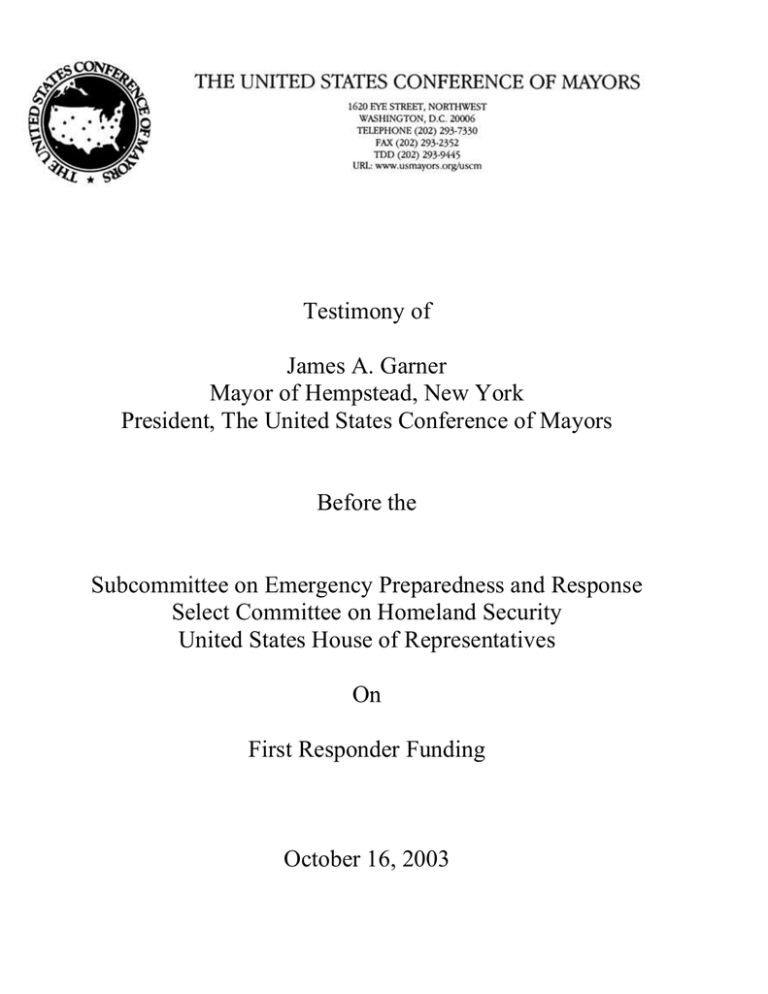
Testimony of James A. Garner Mayor of Hempstead, New York President, The United States Conference of Mayors Before the Subcommittee on Emergency Preparedness and Response Select Committee on Homeland Security United States House of Representatives On First Responder Funding October 16, 2003 Good afternoon. My name is James A. Garner. I am the Mayor of Hempstead, New York and the 61st President of the U.S. Conference of Mayors. I want to thank Chairman Shadegg, Ranking Member Thompson and the members of the Subcommittee for this opportunity to testify on HR 3266, the “Faster and Smarter Funding for First Responders Act.” One month after September 11, the Conference of Mayors sponsored an Emergency Summit with more than 200 mayors, police chiefs, fire chiefs and emergency managers at which we developed a National Action Plan. One of the key recommendations was for a first responder block grant containing direct funding to help prevent and respond to any attacks on our cities. But cities have not sat back and waited for federal assistance before working to secure our homeland. Our national surveys have shown that cities spent billions of dollars after 9-11 on equipment, training and overtime, numbers which increased during the war and periods of high alert. We also strengthened our regional partnerships and mutual aid agreements, which is certainly the case in Nassau County where I live. Mayors appreciate that Congress and the Administration are now providing significant funding intended to help first responders. However, as we stated when the program was first proposed, we believe that money intended for local first responders should not be provided through the states. We were concerned that the funding would not reach first responders in a timely fashion, or be provided in a manner that promotes prevention as well as response. Unfortunately, we are finding this to be the case. On October 17, the Conference of Mayors released a new survey tracking homeland security funds sent to the 50 states. The analysis surveyed 168 cities of all sizes, with at least one city in every state. We found that over half of the cities have either not been consulted or have had no opportunity to influence state decision-making about how to use and distribute funding. The survey also found that 80 to 90 percent of cities had not received funds from the country’s largest federal homeland security program -- the state block grant. I would ask that this survey be made a part of the record. We note that while the law requires that states sub-allocate 80 percent of the funding to local governments, once that funding is sent to county or regional governments -- which is often the case -the deadlines end and there is no further time requirements on getting funds to cities. 1 We are also hearing that some states may be planning to purchase equipment they think local governments need, and send it to them without input. We appreciate that Chairman Cox shares our concern that funding be provided to communities at risk and that it not be stalled at the state level. One of the recommendations that emerged from our Homeland Security Task Force was that if states fail to meet deadlines, the Department of Homeland Security should be required to develop an appeals system to get funds directly to cities. We are very pleased that such a provision is contained in HR 3266, and urge that the requirement be made mandatory. We also appreciate the support in the bill for existing law enforcement partnership programs such as COPS, Local Law Enforcement Block Grants, and Fire Grants. We would also ask that continued support be provided for the high-threat urban security grant program that has been successful in moving funding to cities and fostering regional cooperation. While HR 3266 does not contain direct funding for cities -- as we continue to call for -- we recognize the effort to move the funding more locally by allowing regions to apply for assistance. As this Subcommittee moves forward with this proposal, we would like to raise several issues. First, it is not clear to us how a region would be defined, and to what extent individual cities would have a say in this process. We would be very concerned if regional authorities would have the ability to apply for funding on behalf of cities without their consent or engagement in the process. Second, we are not clear on what the requirements would be for the Department of Homeland Security to approve regional applications, or instead continue to send funding through the states. Third, we recommend that an increased focus be placed on terrorism prevention. To do this, there simply must be funding provided for overtime assistance at times of higher alerts, for specific local concerns, and for training. There is no equivalent for more officers on the streets engaging with the community to provide local intelligence and prevent attacks. I also want to comment on HR 3158, the PREPARE Act, introduced by Representative Turner and other Members of Congress. We appreciate that this bill works to develop standards based on threat and vulnerability assessments, foster state-wide planning with local input, and provide for personnel reimbursement during elevated threat levels. However, we remain concerned about that lack of direct funding and lack of pass-through guarantees. We are also concerned that the planning processes contained in the bill at both the federal and state levels could further delay funding from reaching first responders. 2 To conclude, let me make two points. Mayors believe that without some kind of predictable, direct funding -- rather than year-byyear decisions made at the state level -- it will be difficult to budget for long-term homeland security activities at the local level. After all, equipment must be maintained, training must be continually enhanced, and vulnerable infrastructure and public events must be secured -- especially during heightened alerts. We also request that Congress work with the Department of Homeland Security to closely monitor how first responder funding is currently flowing through the states. We would urge that DHS and the states be required to provide very detailed information as to exactly which local governments have received pass-through funding, and for what. I want to thank the Subcommittee for this opportunity to testify on behalf of the U.S. Conference of Mayors, and we look forward to working with you as together, we strengthen our nation’s homeland defense. 3

